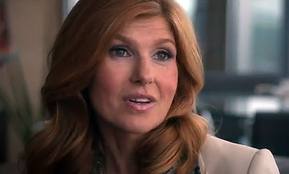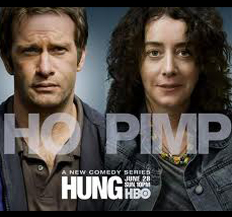
During a fall semester so busy that I haven’t been able to blog for almost eight weeks, one of my guilty television pleasures has been watching Nashville (ABC), which is now on hiatus until January 9. How could I resist a series starring Connie Britton, much beloved from five seasons on Friday Night Lights and just off of one season in American Horror Story? In Nashville, the country music soap opera written and produced by Callie Khouri (Thelma and Louise), Britton stars as Rayna Jaymes (oh for those twangy “ay’s”!), a middle-aged country star who feels her heels nipped by a young, all-about-Eve-inspired upstart named Juliette Barnes (Hayden Panettiere).

To Rayna’s chagrin, her two young daughters love Juliette and her music. Rayna thinks that Juliette represents a new generation of country, gaudy and arrogant, inspired by pop and rock and boasting the kind of celebrity in which talent is boosted into the limelight by notoriety. But as FS2 says, though the show might critique Juliette’s looser morals, it doesn’t dispute her talent. She’s young; she became a star quickly; and she knows how to manipulate her fan base with music videos and social media, while Rayna clearly prefers a more old-fashioned cult of personality and charisma. But when Rayna’s latest album fails to move up the charts, her bottom-line-oriented record company suggests she tour with Juliette, performing as the younger woman’s opening act. Rayna refuses, sparking a personal and professional competition between the two women that plays out on the storied stages of Nashville, in small local bars, in the singers’ rehearsal halls, and even in their bedrooms.
I love seeing Britton return to a version of her Friday Night Lights character, Tami Taylor, the stalwart, smart, feisty but empathetic wife/mother/guidance counselor/school principal she played for five years (2006-11) on the acclaimed and way too short-lived NBC series. While Rayna has all of Tami’s grit, she’s gilded by country music stardom, which requires Britton to refashion the earthy Tami archetype into a sexier, more public version of herself.

No one does exasperation quite like Britton, and Nashville gives her a lot to roll her eyes over. Eric Close, as Rayna’s husband, Teddy Conrad, plays a morally flawed, emotionally ambivalent character that lets Close shake off years of playing close-mouthed detectives in crime dramas like Without a Trace. The lock-jawed, impassive, and not too impressive Powers Boothe plays Rayna’s father, Lamar Wyatt, the local kingmaker who’s intent on using Teddy to fulfill his own political desires and his capitalist greed.
Teddy has been jostled into political position by the scheming Lamar, who sets him up to run for mayor of Nashville so that Wyatt can protect his own real estate interests. Rayna had promised her support to Coleman Carlisle (Robert Wisdom), the local African American politician who now must run against Teddy and Wyatt’s heavy-handed interests.
Nashville seems vaguely interested in the city’s racial politics, although they no doubt won’t figure as heavily as they did in Friday Night Lights, in which Britton’s character often sorted out the taut tensions of race and class in the two high schools the show depicted. But Rayna, in Britton’s hands, is acutely sensitive to political undercurrents and empathetic to the marginalized. Britton excels playing a particular brand of heroine: the casually sexy, liberally inclined, irony-aware but earnest, strong but emotionally resonant middle-aged woman.

Britton isn’t exactly a singer, but as an actor, she plays a very convincing version of a country music star. With her low-slung jeans and studded shirts, her relatively bigger hair, her closed eyes and clutched microphone, she delivers on the soulful, thwarted romance themes of the genre. Britton fashions Rayna into a country music icon who won’t be shoved aside.

One of Nashville’s plotlines follows Rayna’s still-simmering attraction to her band member and former writing collaborator, Deacon Claybourne (Charles Esten). Esten’s handsome, smoky-sexy Deacon provides the polar opposite to Close’s buttoned down, diffident Teddy. Britton and Esten have terrific chemistry. In the show’s second episode, Rayna joins Deacon in a duet at the Bluebird Café, a (real life) proving ground for up-and-coming singer-songwriters and an intimate setting in which old-timers try out new material and play for the love of music. A powerful producer has suggested that Rayna and Deacon go out on the road alone to perform their old songbook, so they play a number in front of sympathetic fans at the small café.

The beautiful guitar-backed song adds more heat to the couple’s old flame and the actors handle the moment with a lovely sense of rue and longing. Seeing a man and woman with lines on their faces regret their lost romantic opportunities just isn’t that common on television. I found myself moved by the moment, partly because Rayna’s wistfulness and her on-going desire for Deacon is so persuasive and clear.
The plot uses Deacon as another pivot around which Rayna’s and Juliette’s competition turns. Juliette wants to steal him from Rayna’s band, and seduces him into her bed as a prelude to the professional coup she schemes. It’s a tad unbelievable that the otherwise upright Deacon would fall for her wiles; he’s a recovering addict with a sober sense of morality. He’s also a middle-aged man no doubt flattered by young Juliette’s sexual attentions. But he and Rayna seem to have a long-lasting, deep bond, which makes his betrayal seem too easy.

That said, Deacon’s tryst with Juliette is casual and fleeting. He ushers the girl’s wild-card mother, Jolene (Sylvia Jefferies), into rehab and tries to help Juliette forgive the woman’s bad parenting. But Juliette resents the depravations of her white-trash past and only sees her mother as a threat to the fairy-tale image Juliette and her handlers try to create. When Juliette acts out with some gratuitous shoplifting and then refuses to atone for the theft properly to her adoring fans, her manager insists she date Sean (Tilky Jones), a squeaky-clean athlete, to burnish her public image.

Although she bristles at the arrangement, Juliette and the square-jawed Sean hit it off. Turns out he’s from a conservative religious family and, in one of the show’s least believable plot twists, refuses to have sex outside of marriage. That a guy with six-pack abs and palpable sex appeal would be a chastity-promoting bible-thumper strains credulity. But the always wily Juliette plays along—in the last episode aired, she asks Sean to marry her.
None of Nashville‘s characters are quite as good as Britton’s Rayna James. With Britton’s trademark determination to do right by her character, and her insistence that Rayna should have a life of respect and dignity, Rayna is the series’ fulcrum and focus. And as FS2 says, what a pleasure to see a female lead character who’s not a gun-toting detective, like most other central women on television. Rayna’s struggle to maintain her dominance (and her heart and her ethics) in the country music world gives Nashville some feminist heft.

Some of Nashville’s secondary characters are drawn too quickly, but maybe they’ll gather depth as the show plays along. Rayna’s sister, Tandy (Judith Hoag), is their father’s toady, with nefarious financial motives of her own for cow-towing to the old man. Scarlett (Clare Bowen), a poet/waitress at the Bluebird, starts the season living with Avery (Jonathan Jackson), a would-be rocker eager to make his mark in the music business. But she’s drawn into a song-writing/singing partnership with Gunnar (Sam Palladio), who’s already fallen in love with her. Their romantic duets are heartfelt and tuneful and nicely mirror the primary relationship between Rayna and Deacon.
The Avery subplot carries the weight of conventional how-to-make-it-in-show-biz stereotypes. When he starts sleeping with his older female agent to make his way to the top, Scarlett leaves Avery. But the remarkably naïve (though wonderfully talented) young woman can’t yet admit that she already reciprocates Gunnar’s desire.
Khouri’s husband, T Bone Burnett, provides original music for Nashville, and has contracted a host of famous musicians (Elvis Costello and Diane Krall, among others) to write for the show. Although Nashville follows in the music-theatre-television footsteps of Glee and Smash, the music here is integral to the narrative, and so far, the show has a clear sense of the soapy story it means to tell.
With singing a natural part of the character’s lives, Nashville doesn’t have to force rhyme and reason onto its musical numbers. The first season of Smash did so without much success, unable to fuse its Broadway musical setting with the strangely unmotivated performances that happened in the characters’ off-stage lives (like that notorious Bollywood number). Even Glee often forces performances into its story inorganically, though it’s maintained a healthy sense of its own absurdity, where Smash saw itself as fatally serious. (With a new show-runner onboard Smash for the upcoming season, all bets might now be off.)

Unlike Glee or Smash, the music on Nashville has a logical function in the narrative. Watching Britton and Panetierre put over songs curated by Burnett is a lot of fun and the country style hides the weaknesses of the actresses’ vocal talents. They both act the hell out of their songs, keeping most of the singing firmly ensconced in the narrative trajectory that the music helps deliver. (See Jon Caramanica’s smart piece in the New York Times, “The Soundtrack as Co-Star,” about how the show takes advantage of real Nashville musicians to produce some very good cuts, now released as an original soundtrack recording.) For example, when Rayna and Juliette are forced to sing a duet at the Ryman Auditorium, a marquee Nashville venue, they reluctantly but successfully write and then perform a number that lifts the roof off the hall while it keeps their characters’ mutual mistrust and distaste intact. It’s a beautiful performance (and a terrific song).

Britton and Esten, as Deacon, cook up some nice heat, playing their never resolved, still simmering romance. Will Rayna and Deacon be together at the end as they’re meant to be? Will he maintain his hard fought sobriety and stave off the addictions that kept him from being with Rayna in the first place? Will Teddy’s relationship with an old high school sweetheart sabotage his campaign for mayor? Will Juliette’s addicted white trash mother ruin the career of a daughter trying very hard to cover up her less than pretty past?
Ultimately, none of this matters very much. The actors lift the material from melodrama’s nether regions, but it’s mostly the music that carries the series. When Khouri keeps her eye on the songs and everyone’s relationship to them, Nashville tightens up and means a little something more than contrived competitions and comeuppances. You can see why young and fading stars would want to keep wrapping their vocal chords around those lush tones and twangs. When the music is the message, Nashville sings.
Of course, it’s also just nice to see Britton headlining a series. And it’s great fun to see her paired with such a worthy nemesis as Panetierre’s Juliette. I just wish the stories were a little more complex and sophisticated and that the show regarded its audience as adults with attention spans and reading skills. Kind of like Friday Night Lights used to do.
The Feminist Spectator


 With only two episodes aired, it’s difficult to say where exactly Smash, the new NBC series about backstage Broadway lives, will take us. Executive produced and so far written by playwright Theresa Rebeck, the show responds to Fox’s Glee by embedding lavish musical numbers in its story of a lyricist-songwriting team creating a Broadway show about Marilyn Monroe. The plot line so far addresses the intrigue that surrounds producing, casting, and directing such a behemoth.
With only two episodes aired, it’s difficult to say where exactly Smash, the new NBC series about backstage Broadway lives, will take us. Executive produced and so far written by playwright Theresa Rebeck, the show responds to Fox’s Glee by embedding lavish musical numbers in its story of a lyricist-songwriting team creating a Broadway show about Marilyn Monroe. The plot line so far addresses the intrigue that surrounds producing, casting, and directing such a behemoth.





